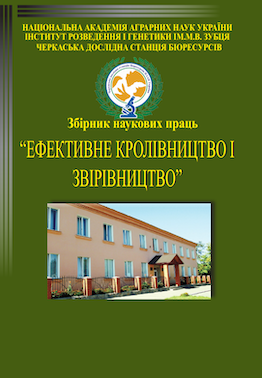THE INFLUENCE OF SILICON COMPOUNDS ON HEMATOLOGICAL, BIOCCHEMICAL AND CLINICAL INDICES OF THE ORGANISM OF RABBITS
DOI:
https://doi.org/10.37617/2708-0617.2020.6.144-155Abstract
The aim of the study was to investigate the effects of nanotechnology and sodium metasilicate on the content of total calcium and inorganic phosphorus and individual lipids in the blood of rabbits from 52 to 110 days of life. Studies were conducted on young rabbits of Hyla breed in the private sector. Rabbits for the study were selected at the age of 41 days on the principle of analogues, weighing 1.2–1.4 kg, were divided into six groups (control and five experimental), 6 animals (3 males and 3 females) in each. Animals were kept in with adjustable microclimate and illumination in mesh cages measuring 50×120×30 cm, in accordance with modern animal health standards. The control group rabbits were fed without restriction a balanced granular compound feed, with free access to water. Animals I, II, and III of the study groups were fed a control group diet and fed citrate silicon for 24 hours, with a corresponding rate of 25; 50 and 75 μg Si/kg body weight. Young animals of the IV and V experimental groups were fed diet of the control
group and water was given sodium metasilicate (Na2SiO3H2O) in the amount of 2.5 and 5.0 mg Si/kg body weight, respectively. The experiment lasted 68 days, including the preparatory period of 10 days, the experimental period – 58 days. In the preparatory period – at 52 days and experimental at 83 and 110 days of life (31 and 58 days of drinking additives) in 4 animals (2 males and 2 females) from the group blood samples were taken for biochemical studies. Analysis of changes in the red blood count of rabbits indicates a more pronounced effect of prolonged ingestion of organic compound silicon in the amount of 50 and 75 μg Si/kg body weight in animals of II and III experimental groups on the stimulation of erythropoiesis and hemoglobin. The total leukocyte count in the blood of animals of the third study group was higher (P <0.05) at 31 days of study, with a tendency to increase in the number in the II-IV groups at the end of the study compared to the control group. The total protein content in the blood of rabbits I, II and III of the study groups was respectively higher (P <0.01) at 31 days of study and 5.1; 5.2 and 6.4% (P <0.05) at the final stage of the experiment (58 days study) compared with the control group. Whereas, the use of sodium metasilicate in the rabbit diet was noted in the blood of animals only in the IV experimental group with a significant increase in this indicator compared to the control. Drinking silicon citrate and the purpose of sodium silicate was not marked by significant changes in the clinical parameters of their body, but trends within the physiological norm


